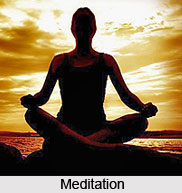 Meeting deadlines, excess work pressure, frustration and other kind of anxieties restricts us from bringing positive energy within our body. At this juncture all we have to do is to unwind ourselves, forget about the amount of pressure we are facing and refresh our mind. The next thought that strikes us is how we are going to do this. Well, this is not an impossible task. Our human body is beautifully equipped to deal with stress. However, this is only to a certain stage. There is no single answer to dealing with the vast range of problems produced due to stress, but the most important steps that any of us take along the road coping with stress are: to recognize it, to understand it, to use `good` stress to our advantage, to deal with `bad` stress appropriately & above all to help ourselves.
Meeting deadlines, excess work pressure, frustration and other kind of anxieties restricts us from bringing positive energy within our body. At this juncture all we have to do is to unwind ourselves, forget about the amount of pressure we are facing and refresh our mind. The next thought that strikes us is how we are going to do this. Well, this is not an impossible task. Our human body is beautifully equipped to deal with stress. However, this is only to a certain stage. There is no single answer to dealing with the vast range of problems produced due to stress, but the most important steps that any of us take along the road coping with stress are: to recognize it, to understand it, to use `good` stress to our advantage, to deal with `bad` stress appropriately & above all to help ourselves.
As the effect of stress is determined by how we view and handle the stress, by how we appraise the stress; it becomes very important to re-evaluate how and why we consider any situation or the event as the stressful situation. What we perceive as the threatening situation may entirely appear so due to our own faulty perception. Thus, the Management of Perception could be one of the major components of the coping strategy. The whole of the Yogic approach, especially its philosophical aspect emphasizes on this change of outlook towards our circumstances.
The other important component of the coping strategy is the Management of Time. The impatience and time pressure are the two most important elements in the life-style of the modern man, which lead to feeling of being under stress.
 The stress of time urgency is entirely self-generated. Worried that there never seems to be enough time to get anything done, people often leave insufficient time to complete tasks, try to cram too many activities into a short period, or do several things at once, darting haphazardly from one to another. The immediate consequence of this type of behavior is: undone job pile up or completed late, deadline loom, tempers are lost and anxiety and panic ensues. Thus, it would be very much necessary to learn how to set the priorities, how to distribute the work, how to complete the tasks in the hand before taking up the new ones, and how to say `NO` for the additional tasks when our hands are already full.
The stress of time urgency is entirely self-generated. Worried that there never seems to be enough time to get anything done, people often leave insufficient time to complete tasks, try to cram too many activities into a short period, or do several things at once, darting haphazardly from one to another. The immediate consequence of this type of behavior is: undone job pile up or completed late, deadline loom, tempers are lost and anxiety and panic ensues. Thus, it would be very much necessary to learn how to set the priorities, how to distribute the work, how to complete the tasks in the hand before taking up the new ones, and how to say `NO` for the additional tasks when our hands are already full.
The last and the most important component of the coping strategy is the management of Health Status. It has been observed again and again that when you are fit and healthy, your ability to deal with any stressful situation is manifold increased. On the other hand when you are suffering from illness or your body is in the ailing state leading to easy fatigability, the feeling of being under stress even with trivial things comes more easily. Thus if we want to increase our defense against the feeling of stress, we need to rest, relax, exercise, perform yoga and having a proper diet.
Yoga offers many breathing skills for stress-affected individuals, these expertise are useful in relieving stress and anxiety including many other ailments. Stressed out individuals carry a great deal of physical tension in their bodies, in these cases the natural unblocking effected by yoga postures is helpful. When one rests between postures, abdominal tension is released from the body promoting deep breathing. The benefits of yoga postures (asana), breathing (pranayama), and meditation (dhyana) include increased body awareness, release of muscular tension and increased coordination between mind-and body. It helps in better management of stress and ensures an overall feeling of well being.
Using the laughter therapy for relieving stress is also a very effective means to deal with stress. Laughing is found to lower blood pressure, reduce stress hormones, increase muscle flexion, and boost immune function by raising levels of infection-fighting T-cells, disease-fighting proteins called Gamma-interferon and B-cells, which produce disease-destroying antibodies. Laughter also triggers the release of endorphins, the body`s natural painkillers, and produces a general sense of well-being.




















